-
IP addresses are NOT logged in this forum so there's no point asking. Please note that this forum is full of homophobes, racists, lunatics, schizophrenics & absolute nut jobs with a smattering of geniuses, Chinese chauvinists, Moderate Muslims and last but not least a couple of "know-it-alls" constantly sprouting their dubious wisdom. If you believe that content generated by unsavory characters might cause you offense PLEASE LEAVE NOW! Sammyboy Admin and Staff are not responsible for your hurt feelings should you choose to read any of the content here. The OTHER forum is HERE so please stop asking.
You are using an out of date browser. It may not display this or other websites correctly.
You should upgrade or use an alternative browser.
You should upgrade or use an alternative browser.
Sense of Entitlement incidents
- Thread starter LITTLEREDDOT
- Start date
how about the resident cabinet clown who thinks toothpicks are a traditional chinky dessert to be had after meals, and takes an inordinate amount "to go"
Is his salary very low ?
When you have absolute control of a country like Spore for 50 years you can make $$$$...
oy yoh yoor! give me one year enuff liao
8. Chua Sock Koong, CEO of SingTel (22 Jan 2015).
Chua Sock Koong is the daughter of PAP minister Chua Siang Chin. She inherited the SingTel CEO position. With her million $ salary, she is disconnected from the peasants. She benefits from an oligopoly market structure in telecommunications. Instead of think how to reduce telecommunication costs for consumers, she is thinking of how SingTel and the telcos can make even more money.
SINGTEL: FACEBOOK, YOUTUBE AND WHATSAPP SHOULD PAY US FOR END USERS TO HAVE FASTER ACCESS
22 Jan 2015 - 5:01pm

Temasek Holdings-owned Singtel CEO Chua Sock Koong have reiterated her call to charge content provider like Facebook, Whatsapp and Youtube for end users to have faster access. She has also claimed that if internet service providers (ISPs) do not upgrade their network, these leading application companies cannot deliver a good experience to their users. Using US-based video website Netflix as an example, she expects ISPs like Singtel to be paid by content providers for a "speed boost".
If Singtel gets to charge content providers for a "speed boost", it is very likely free applications like Facebook, Youtube and Whatsapp will pass the costs over to Singaporean users. Singaporeans may soon find themselves having to pay more for the free applications if the Singtel CEO gets her way or having to deal with slow connections on these applications.
Telecom companies have been losing profits on the traditional SMS service as more mobile users turned to web-based applications for messaging short text. In a response to this trend, Singtel, Starhub and M1 started reducing the usual data limit from 12GB to 2GB in June 2012. They will also most likely see their profit shore up if their request is approved by the Infocomm Development Authority (IDA).
In America, President Obama is laying legislations for "Net Neutrality" where ISPs are not allowed to create "speed boost" service for content providers who pay more.
The 59 year old former CFO overtook the Singtel CEO profile from the brother of Prime Minister Lee Hsien Loong in 2007.
Chua Sock Koong is the daughter of PAP minister Chua Siang Chin. She inherited the SingTel CEO position. With her million $ salary, she is disconnected from the peasants. She benefits from an oligopoly market structure in telecommunications. Instead of think how to reduce telecommunication costs for consumers, she is thinking of how SingTel and the telcos can make even more money.
SINGTEL: FACEBOOK, YOUTUBE AND WHATSAPP SHOULD PAY US FOR END USERS TO HAVE FASTER ACCESS
22 Jan 2015 - 5:01pm

Temasek Holdings-owned Singtel CEO Chua Sock Koong have reiterated her call to charge content provider like Facebook, Whatsapp and Youtube for end users to have faster access. She has also claimed that if internet service providers (ISPs) do not upgrade their network, these leading application companies cannot deliver a good experience to their users. Using US-based video website Netflix as an example, she expects ISPs like Singtel to be paid by content providers for a "speed boost".
If Singtel gets to charge content providers for a "speed boost", it is very likely free applications like Facebook, Youtube and Whatsapp will pass the costs over to Singaporean users. Singaporeans may soon find themselves having to pay more for the free applications if the Singtel CEO gets her way or having to deal with slow connections on these applications.
Telecom companies have been losing profits on the traditional SMS service as more mobile users turned to web-based applications for messaging short text. In a response to this trend, Singtel, Starhub and M1 started reducing the usual data limit from 12GB to 2GB in June 2012. They will also most likely see their profit shore up if their request is approved by the Infocomm Development Authority (IDA).
In America, President Obama is laying legislations for "Net Neutrality" where ISPs are not allowed to create "speed boost" service for content providers who pay more.
The 59 year old former CFO overtook the Singtel CEO profile from the brother of Prime Minister Lee Hsien Loong in 2007.
She's the mother of our nation. She provided our Founding Father with advice to rule Singapore wisely, provided Singapore with two fine Brigadier Generals and Primer Minister, a top-notch medical doctor, and did a lot of important legal paperwork for the benefit for many sinkies who bought HDB apartments. Her contributions far exceeded some loser ex-president who attempted to exceed the boundaries of his office by meddling in the government. I am glad he did not get a state funeral.
since when was "mother of our nation" a political office befitting a state funeral? she would turn in her grave to hear of such an abuse of power.
And there's Gecko's gun carriage funeral procession. What had she done for Singapore apart from spreading legs for LKY and squirting out some really ugly children?
Free publicity for for Polar puffs and cakes
Is his salary very low ?
yes, he wants more to set up a factory producing the same and if possible, an air-con factory to employ you, can

Letter of the week: Long queues show sense of entitlement may have dulled sense of perspective
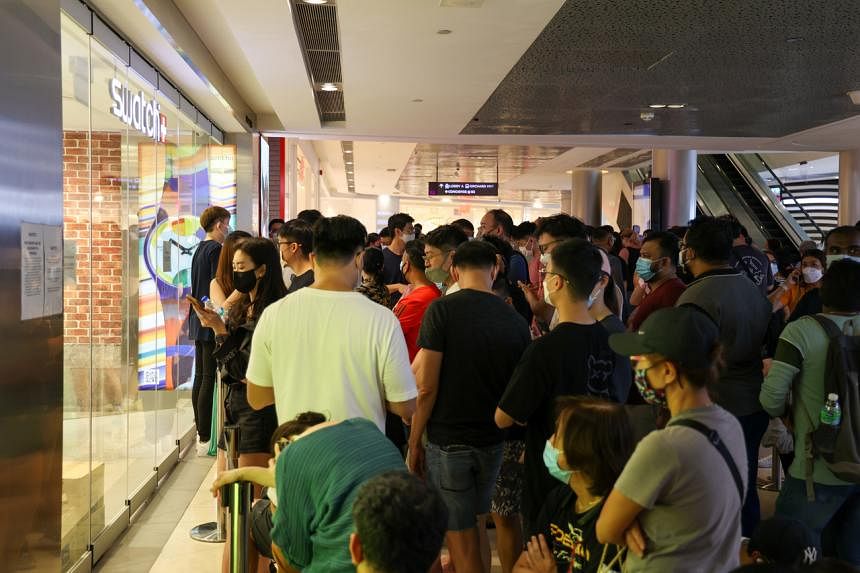
People queueing for the Omega x Swatch collection at ION Orchard on March 26, 2022. PHOTO: LIANHE ZAOBAO
Apr 2, 2022
The bedlam that resulted from the launch of the collaborative collection by watchmakers Omega and Swatch last Saturday provides us with food for thought (Omega x Swatch collection draws snaking queues at Ion Orchard, MBS, March 26).
Snaking queues had formed outside the Swatch stores at both Ion Orchard and Marina Bay Sands.
As there was no clear queueing system in place, it was inevitable that tempers began to fray when people were perceived to be cutting queue.
Although staff and even police officers were roped in and barricades were erected to manage the crowd, it was too little, too late.
While the onus should have been on the stores to anticipate the overwhelming interest and implement pre-emptive crowd-control measures, the ugly scenes of people jostling and shouting at police officers should not be condoned.
This incident is a good example of a "First World problem" stemming from the need for self-gratification.
It is a regrettably tone-deaf parallel of the scenes in war-ravaged countries of desperate people queueing up for food and supplies or safe passage.
Affluence and a sense of entitlement seem to have dulled our sense of perspective and affected our list of priorities.
There ought to be more important things in life that demand our attention.
If we cannot spare a thought for others in dire straits, we should at least try to channel our time and efforts to more constructive purposes.
Marietta Koh
Thinking Aloud
Mind the culture of entitlement among 'big shots'
People can accept huge differences in wealth but they will revolt if there is a privilege and entitlement divide between elites and masses

Han Fook Kwang
Editor-at-Large
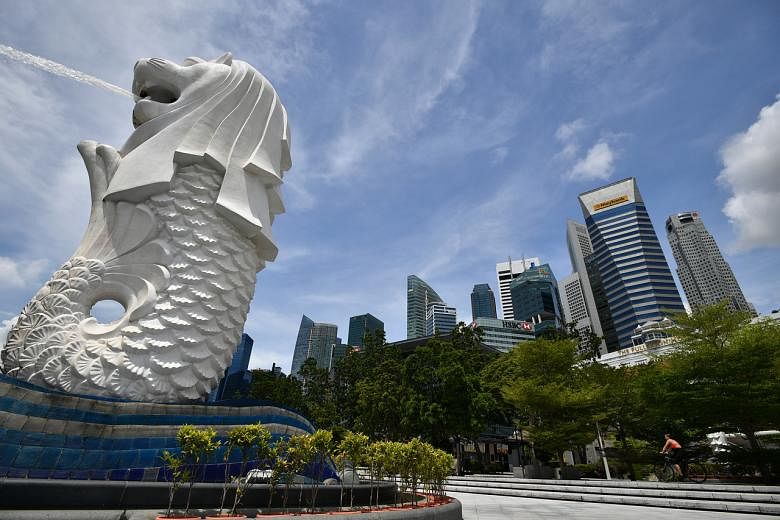
SEP 20, 2020
Every now and then, something happens which tells you a bit about the country, its people and how things have changed, or not.
The case of Ms Parti Liyani, former maid of Mr Liew Mun Leong, who had been convicted earlier of stealing from her employer but had the decision overturned on appeal, is one such example.
There are insights and lessons that can be drawn from it, and, to borrow a phrase often used about the pandemic, Singapore should not let the experience go to waste.
What issues have emerged in the public discussion, online and in mainstream media, so far?
First is the question of privilege and entitlement enjoyed by the rich and influential, including their access to justice and corridors of power.
It became a talking point after the appeal judge, Justice Chan Seng Onn, highlighted a number of discrepancies in the police investigation and subsequent prosecution of the case by the Attorney-General's Chambers, leading Law and Home Affairs Minister K. Shanmugam to say that something had gone wrong in the chain of events.
"We have to look at that, and deal with what went wrong," he noted.
Conversely, it raises the question of whether the system is biased against the poor and vulnerable, including migrant workers, who have little means to prove their innocence, especially when they are up against the high and mighty.
The Government has to deal with these issues openly and forthrightly - not just to appease public outrage but also because they strike at the heart of what makes Singapore what it is, which has to do with the integrity and effectiveness of its public institutions.
People can accept huge differences in wealth, say, between a business tycoon and his servant. That is the reality of a capitalist society like Singapore.
But they will revolt if, on top of this wealth gap, there is a privilege and entitlement divide that separates the elites from the masses.
It is the reason why there is such widespread anger against elite power in some countries in the West, creating growing distrust of the government.
Hence, the Government should make sure that its review of the case is as objective and thorough as possible, and more important, be seen to be so.
When Parliament debates the matter next month, as it is likely to following Mr Shanmugam's ministerial statement and the motion the Workers' Party intends to introduce, I hope there will be a thorough airing of not just the issues raised in Justice Chan's judgment but also this broader question: How to protect the Singapore system from being abused by people with position and wealth, whether deliberately or as a result of institutional or cultural bias?
In raising this, I am not suggesting that Mr Liew is guilty of using his position to influence the various agencies to pursue the prosecution of Ms Parti.
There has been no evidence of this and he should be presumed innocent until proven guilty, even though he and his family may have committed other transgressions, as highlighted by Justice Chan.
Whatever the findings of the Government's review, this is an opportunity to debate whether more can be done to protect public agencies and their officers from undue influence or institutional bias, and to do more to ensure everyone is treated equally, especially the poor and vulnerable.
In fact, it is even more important to have this discussion today because government-linked companies are an even larger part of the economy today than in 1996, with more civil servants and former officers running these businesses or sitting on their boards.
People at the top, whether in Government or business, have more connections with one another, move in the same social circles and can easily open doors for one another.
Some of this is inevitable and impossible to avoid. But the problem is precisely that a bit of it here and there can slowly but surely lead to an entitlement culture if unchecked.
The Japanese have a word for this called sontaku - the pre-emptive following of an order that has not been given, a nod-and-wink understanding of what needs to be done among those in an inner circle.
There have been a number of political scandals arising out of this, including a recent one involving former premier Shinzo Abe in which land sold to a school with links to him and his wife was transacted at a much reduced price.
Singapore has to guard against this as much as it did against corruption.
The effort has to be relentless because even if only a handful at the top is corrupt, those below will begin to wonder why they cannot also get a share, and soon everyone will want his entitlement.
In a meritocratic system like Singapore which rewards successful people amply, the task of making sure that the resultant income divide does not lead to social and political problems falls not only on the Government but also on those who have made it.
To be fair, many have done so by contributing in various ways, including philanthropy and in volunteering their services for the community.
What is important is a mindset and attitude that every person matters equally and all have much to contribute, though in different ways.
It is when any group feels it is superior and has a special place that problems occur.
Founding prime minister Lee Kuan Yew recognised this problem way back in 1967 when he spoke to grassroots leaders, many of whom were businessmen. He was as usual blunt and forceful but his words are as relevant today, more than 50 years later, and you should read them in full: "If you really sit down and think, you will know why you must have time and feeling for the people who are not so successful.
"Then, they will leave you in charge to make the decisions, to make their lives better. But if they think they are leaving you in charge and you are making decisions to make your life better at their expense, then there will be trouble.
"If you act like a big shot, not only will you collapse but you will also bring the Government down. Therefore, when anybody acts like a big shot, my job is to take the pin and poke the balloon and break it."
The public outcry over Ms Parti's case shows that Singaporeans expect the Government to be still holding that pin.
• The writer is also senior fellow at the S. Rajaratnam School of International Studies, Nanyang Technological University.
Thinking Aloud
Asking awkward questions of the powerful
Social activists disturb our comfort, making us consider new ways of living together

Lydia Lim

SEP 20, 2020
We were looking at menus when he popped the question: "So, what do you consider the greatest social problem of our time?"
Unsure how to respond, I kept quiet. The other person in our group of three had known Mr Social Conscience for far longer, so he kept his eyes fixed on the menu and muttered: "I just want to order dessert."
That incident from long ago captures my own experience of being thrown off balance by a friend who was more socially aware than I was. Today, the term for a heightened state of social awareness is "woke", defined since 2017 by the Oxford English Dictionary as "alert to injustice in society, especially racism".
I recall that memory with mixed feelings as I observe the ferment over migrant worker rights and the questions being raised over Singapore's justice system, in the wake of the High Court's recent acquittal of Ms Parti Liyani, a foreign domestic worker who had been accused by her former employer, Mr Liew Mun Leong and his family, of having stolen tens of thousands of dollars' worth of goods from them.
On Facebook, I read a post that said "we live in a time when a maid can bring down a chairman".
Do we?
CHALLENGING STATUS QUO
Social media amplifies anti-establishments points of view that some of us may find new and discomfiting, but Singapore is nowhere near a social upheaval. I stress this because defenders of the status quo may fear an overthrow of institutions in place for decades, and thereafter a slippery slope to national ruin.But change does not come so easily, as long-time advocates of social causes well know.
The case in which Ms Parti secured an acquittal against theft charges filed by her rich and well-connected former employer is a rare exception. That is one reason it has become a national talking point and source of debate.
Its fallout suggests a greater ease among some sectors of Singapore society to challenge the status quo, to ask awkward questions of powerful people, and to do so more openly than in the past.
Whether or not you think that is a good thing, it is a new reality that all of us have to grapple with.
The new cacophony of causes and voices is jarring to those of us more used to the harmony of old.
Yes, social harmony is important but I believe too much of it can impede progress. Dissonance can rouse us from our slumber.
ACTIVISTS DON'T FOLLOW TRENDS
Still, not all who question those in power do so responsibly. Some are heady with the feeling of being able to express themselves more freely than before; others do so because it's now cool to be "woke".Those who dally with social causes as a fad are likely to far outnumber those who regard righting certain wrongs in society as a mission. The latter stand out by their actions - they sacrifice time, money and effort in pursuit of justice for those with less power, and they persevere in the face of obstacles.
Among them is Ms Debbie Fordyce, president of migrant workers' advocacy group TWC2. She shared her observations on trendy causes in an interview with academic Philip Holden, which was published on Academia.sg in May.
"I feel strongly about migrant workers because I've been working with this group for so long and I've become aware of what happens while they're in Singapore and after they return home," she said.
"Now, because of the pandemic, they've become a sexy topic, with lots more people wanting to get involved. It's great to have donations and offers to volunteer, but the desire to 'make the world a better place' doesn't require you to seek out a trendy cause...
"Whether with migrant workers, or anyone else in a position of disempowerment, be aware of what inequality, poverty and desperation do to people, both those with privilege and access, and those without. Be prepared to stand up for what you believe."

ST ILLUSTRATION: CEL GULAPA
CASTING STONES IS NOT ACTIVISM
There was little crowing from the activists at the Humanitarian Organisation for Migration Economics (Home) after Ms Parti was acquitted by the High Court.Instead, the charity and its activists - who had believed in Ms Parti's innocence from the beginning, helped her secure legal aid and sheltered and supported her during the four years she fought the case - issued a sober, factual statement to highlight "the systemic difficulties that migrant workers face when they are wrongfully accused".
"Such migrant workers are left waiting in a foreign country while investigations are ongoing, without any indication of the length of such investigations," Home said in its statement issued on the day of Ms Parti's acquittal on Sept 4.
The statement continued: "In Yani's case, she was arrested on Dec 2, 2016, charged on Aug 31, 2017, and has spent almost four years at Home's shelter, waiting for the conclusion of her case. We also provided her a bailor for the sum of $15,000, an option which is not available for most migrant workers accused of crimes.
"These migrant workers are often not allowed to work, thus they are reliant on organisations like Home to provide them shelter, food, and financial assistance. During this time, they are also not allowed to leave the country, and have no means of seeing their families back home.
"Consequently, by the time many migrant workers are presented with charges, they choose to plead guilty even if they are of the view that they are innocent of the charges that they are facing. The time it takes for them to serve their sentence may be shorter than the time it takes to go through the court process. Home believes that every individual should be given a chance to a fair trial, and access to legal representation, regardless of their work pass status or nationality.
"Home would also like to express our deep appreciation for Mr Anil Balchandani, who has worked tirelessly to represent Yani at the trial and appeal stage. We are also very grateful for the many volunteers and interns who have been involved in Yani's case and who helped her manoeuvre the complexities of her case."
Contrast that statement to the online bashing by keyboard warriors, including on the Facebook page of Changi Airport Group, which drew some netizens' ire simply because Mr Liew Mun Leong was then chairman of its board. He has since stepped down from the position.
While it is important for citizens to feel empowered to speak truth to power, there is a difference between using social media to call out individuals online, and actual activism. Former US president Barack Obama said as much in October 2019, during an interview on activism. He spoke out against "call out culture" or "cancel culture", which celebrates the use of social media to sit in judgment of others.
"That's not activism. That's not bringing about change," Mr Obama said. "If all you're doing is casting stones, you're probably not going to get that far. That's easy to do." He also pointed out that "the world is messy; there are ambiguities", adding that "people who do really good stuff have flaws".
More recently, during this year's general election campaign, Prime Minister Lee Hsien Loong also cautioned against a culture of trial by Internet.
I welcome more open debate in Singapore on key social issues, but I also think many of us have much to learn about engaging in ways that are respectful and responsible.
The aim should not be to tear down individuals or institutions but to build a better Singapore, based on - to quote our National Pledge - justice and equality.
Forum: Recent cases show a culture of male sexual entitlement
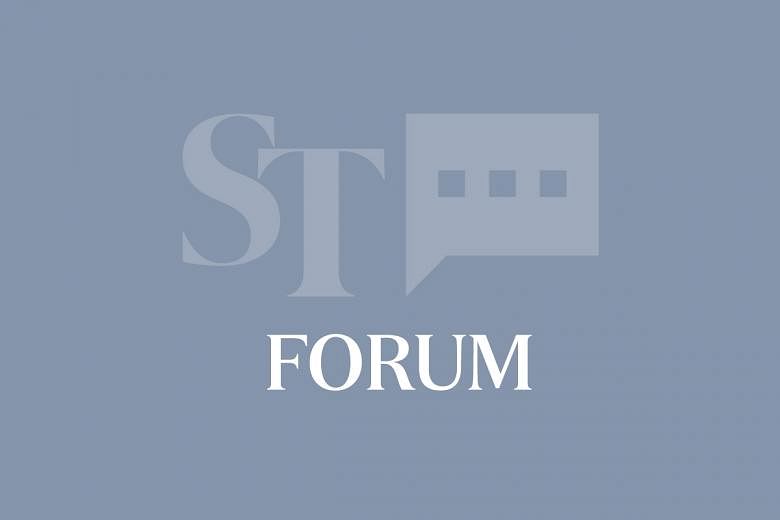
JAN 17, 2020
Two recent reports (Former Yale-NUS College student admits to filming videos of female schoolmates in shower, ST Online, Jan 13; and Man gets 28 years' jail, 24 strokes for sexually abusing stepdaughter, Jan 14) have led me to observe a troubling trend of male sexual entitlement in Singapore.
The man who abused his young stepdaughter said, when she told him to stop groping her, that her body was his and he could touch her anywhere he wanted.
The former Yale-NUS College student who recorded videos of his housemates while they were showering explained his behaviour as a way of de-stressing from his academic pressure, as if his female housemates existed to service his needs.
To me, these statements indicate a habitual objectification of women and girls, treating them like tools for men's gratification instead of autonomous human beings. This culminates in an attitude of male sexual entitlement, a belief that men are owed sexual pleasure on the basis of their gender.
While the aforementioned crimes are clearly of greater severity, I see the culture of male entitlement being normalised through everyday phrases. When men complain about being "friend-zoned" - told by women that they would like to be platonic friends, not romantic partners - they reveal an expectation that they should receive romantic affection from women they are attracted to.
This expectation is unfortunately reinforced by the trope in popular culture of the "persistent" male eventually "getting the girl" by never giving up, even after being rejected. Although seemingly harmless on the surface, this idea tells men that they should be given certain sexual rewards for their efforts in pursuit.
Male sexual entitlement not only hurts women, who suffer harassment as a consequence, but also hurts men.
When one's sense of self is tied to the acceptance of one's advances, rejection can seem like a disproportionate hardship and, in extreme cases, manifest in abusive and harmful actions.
We need better sex education about gender roles in schools, so that students are taught to respect one another and not prioritise their own needs over those of others.
These lessons will also help students identify problematic behaviours and equip them with the knowledge to deal with difficult situations.
By inculcating these values, we can gradually undo our toxic beliefs and work towards a less self-serving society.
Lee Yoke Mun
Letter of the week: Parents' sense of entitlement sets bad example for children
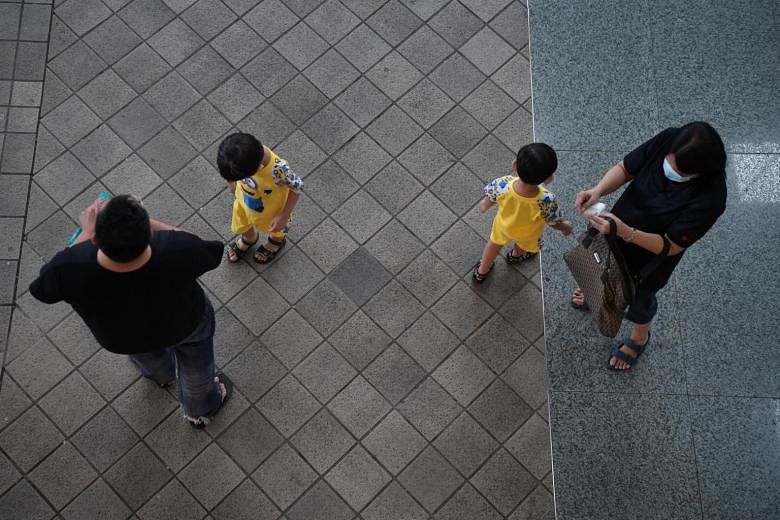
A couple with their two young children at Toa Payoh HDB Hub on Apr 14, 2020. ST PHOTO: KUA CHEE SIONG
NOV 14, 2020
There have recently been letters from parents making demands related to their children's school education (P1 registration: Volunteering at school should guarantee place, Nov 2, and CCAs: Why the choice disparity between neighbourhood and elite schools?, Nov 11).
There seem to have been more of such calls since the last election and it is a worrying sign.
The general mood on the ground seems to be that "if I don't get what I want, it's the Government's fault".
Many policies and guidelines have already been communicated, but some parents choose to ignore them. And when things don't go their way, they air their grievances publicly, and many times, the relevant ministry has to come out and explain the obvious.
I hope we can be less self-centred as citizens and understand that there are limited resources and no perfect policies.
While parents want the best for their children, they should be setting an example for them through their own behaviour.
Making unreasonable demands for oneself is not the right way to go.
Tan Kok Hong
Migrant worker advocate whose work pass was not renewed made misleading public posts: MOM
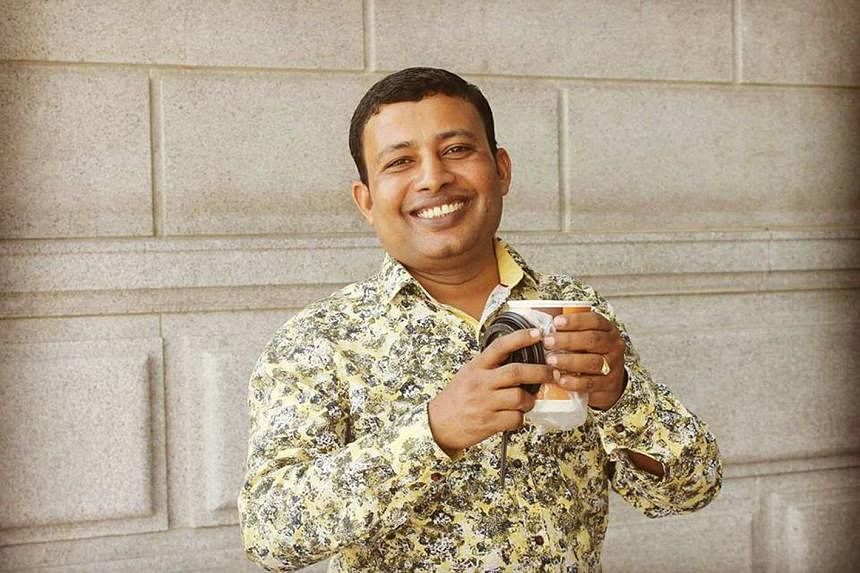
Mr Zakir Hossain Khokan returned to Bangladesh on June 8 after working in Singapore for nearly two decades. PHOTO: ZAKIR HOSSAIN KHOKAN

Kok Yufeng
Transport Correspondent
JUN 22, 2022
SINGAPORE - A migrant worker who was active in local literary circles and founded two community groups here has left Singapore after his work permit expired and was not renewed.
In a Facebook post on Wednesday (June 22), Mr Zakir Hossain Khokan, 43, said he was told by his former employer that the work permit renewal system had initially reflected an "adverse record with a government agency".
He was later told that this was an administrative error and that his work permit was "ineligible" for renewal, he said.
Responding to media queries, the Manpower Ministry (MOM) said it takes into account various factors when assessing an applicant's suitability to work in Singapore and for work passes to be renewed.
The ministry said that by Mr Zakir's own account, Singapore has allowed him to work here for 19 years.
"Through his time in Singapore, he has written often about migrant workers here. We renewed his work pass many times despite his activism and writings," said MOM.
"We draw the line, however, when public posts are misleading, false or deliberately provocative."
It cited a Facebook post that Mr Zakir made last October after a confrontation at Westlite Jalan Tukang dormitory that drew riot police to the scene.
Police had responded to a call for assistance at the dormitory after a confrontation between workers and management over poor quality food and long delays in transporting workers with Covid-19 to recovery and healthcare facilities.
While Special Operations Command officers were on standby, the Ministry of Home Affairs said then that additional police units were not deployed and no arrests were made by the police during the incident.
MOM said Mr Zakir had called migrant workers in Singapore "work slaves", and dormitories here "work camps", and also alleged that soldiers and armoured vehicles had surrounded the dormitory.
"This was a false characterisation," MOM said. "There were no soldiers, let alone armoured vehicles, around."
Mr Zakir had also signed off his post as from the "workers of Westlite Tukang", though he never lived there, noted MOM. The ministry added that Mr Zakir's statements could have incited migrant workers at the dormitory and elsewhere, inflamed their emotions and possibly caused incidents of public disorder.
The ministry said that while Mr Zakir had appealed the non-renewal of his work pass, his employer did not. The appeal was considered and MOM informed him that it was unsuccessful.
It added: "The ability of a foreigner to work in Singapore is not an entitlement. Mr Zakir has been permitted to work in Singapore for a long time, though he was a long-time activist.
"His work pass has since expired. He cannot prolong his stay when he no longer has a job in Singapore. He has overstayed his welcome."
A former freelance journalist and poet, Mr Zakir returned to his home in Bangladesh on June 8 after working in Singapore's construction sector for nearly two decades.
During his time here, he founded literary interest group Migrant Writers of Singapore and started "One Bag, One Book", a book-sharing project for foreign workers here that later helped to distribute supplies to migrant workers living in dormitories when Covid-19 struck.
Mr Zakir took the first prize in 2014 and 2015 in the Migrant Worker Poetry Competition organised by Banglar Kantha, a newspaper here for the Bangladeshi community.
He said in his Facebook post that he received notice from his employer's human resources department on May 24 that his work permit could not be renewed.
Mr Zakir, who declined to name the employer, said: "It was so sudden and unexpected."
Appeals made on his behalf by several non-governmental organisations (NGOs) and individuals, including MP Louis Ng and former NMP Anthea Ong, were not successful. This is according to a letter seen by The Straits Times that was sent to Manpower Minister Tan See Leng.
Ms Ong, who met Mr Zakir five years ago at a community event by her social enterprise Hush TeaBar, told ST that he had approached her for help.
She asked him to appeal directly to MOM and agreed to write to Dr Tan to outline Mr Zakir's contributions to the migrant worker community.
Ms Ong said that MOM has been doing good work in engaging NGOs and migrant workers since it set up a new division called the Assurance, Care and Engagement (ACE) Group in 2020 to care for migrant workers here.
"I hope this matter will not affect ACE's efforts or discourage our migrant brothers and sisters from coming forward to volunteer or create initiatives to support fellow migrant workers," said Ms Ong.
Retrenched GSK employee sues over not being considered for other roles in company

Mr Kallivalap Praveen Nair is now suing the pharmaceutical company for about $1.35 million. PHOTO: GSK
Samuel Devaraj
Jul 27, 2022
SINGAPORE - He was required to relocate to Singapore, after he became a global expert director for nutrition and digestive health business at GlaxoSmithKline (GSK) consumer healthcare.
About two years later, Mr Kallivalap Praveen Nair was retrenched on grounds of redundancy.
He is now suing the pharmaceutical company for about $1.35 million, arguing he was not considered for various roles within the company.
In a trial beginning on Wednesday (July 27), Mr Nair said this was a result of GSK breaching its employment agreement and that had he been given the opportunity to be considered for the roles, he would likely have secured one and would not have been made redundant, according to court documents.
The sum he is seeking from GSK includes about $1.15 million for loss in income as he has been unemployed since June 30, 2020, and about $150,000 which he said was a shortfall in the amount in his severance package.
GSK has counterclaimed against Mr Nair, seeking about $95,200 from his severance package which it said was paid to him by mistake.
Mr Praveen Nair, who moved from India to Singapore in June 2018, is represented by Mr Vikram Nair from Rajah & Tann.
In court documents, Mr Vikram Nair said GSK deprived his client the opportunity to be considered for roles with consumer goods company Unilever to which GSK sold its nutrition business to in April 2020.
He added his client was left off a list of personnel eligible for assessment for Unilever roles published by GSK in early May 2019.
When Mr Praveen Nair asked his manager why this was so, the manager suggested that this may have been motivated by GSK's perception that he would be a threat to the GSK consumer business if he had taken up the equivalent of a global expert role in Unilever.
This is denied by GSK, which is being represented by Wong & Leow. In its defence, GSK said that Mr Praveen Nair was invited to several interviews with Unilever but was ultimately not selected by the firm.
On June 11, 2019, GSK said in an e-mail that a new global head of expert marketing role had been created and that Ms Tess Player, an employee, had been appointed to that role.
Mr Praveen Nair said there was no indication prior to the announcement that the new role had been created and he was not given the opportunity to apply for it.
He argued that by failing to disclose the creation of the new role, GSK is in breach of its employment agreement.
Mr Vikram Nair said that in retaliation for his client's probing into Ms Player's appointment in the new role, he was not fairly considered for other roles.
He added that it also led to his client getting a shorter notice period compared with other retrenched GSK personnel from the nutrition and digestive health business.
GSK said in its defence that Mr Praveen Nair was denied the roles because he was found unsuitable and that he was given the notice period as contractually provided for in the employment contract.
The trial continues on Thursday.
Retrenched GSK employee sues over not being considered for other roles in company

Mr Kallivalap Praveen Nair is now suing the pharmaceutical company for about $1.35 million. PHOTO: GSK
Samuel Devaraj
Jul 27, 2022
SINGAPORE - He was required to relocate to Singapore, after he became a global expert director for nutrition and digestive health business at GlaxoSmithKline (GSK) consumer healthcare.
About two years later, Mr Kallivalap Praveen Nair was retrenched on grounds of redundancy.
He is now suing the pharmaceutical company for about $1.35 million, arguing he was not considered for various roles within the company.
In a trial beginning on Wednesday (July 27), Mr Nair said this was a result of GSK breaching its employment agreement and that had he been given the opportunity to be considered for the roles, he would likely have secured one and would not have been made redundant, according to court documents.
The sum he is seeking from GSK includes about $1.15 million for loss in income as he has been unemployed since June 30, 2020, and about $150,000 which he said was a shortfall in the amount in his severance package.
GSK has counterclaimed against Mr Nair, seeking about $95,200 from his severance package which it said was paid to him by mistake.
Mr Praveen Nair, who moved from India to Singapore in June 2018, is represented by Mr Vikram Nair from Rajah & Tann.
In court documents, Mr Vikram Nair said GSK deprived his client the opportunity to be considered for roles with consumer goods company Unilever to which GSK sold its nutrition business to in April 2020.
He added his client was left off a list of personnel eligible for assessment for Unilever roles published by GSK in early May 2019.
When Mr Praveen Nair asked his manager why this was so, the manager suggested that this may have been motivated by GSK's perception that he would be a threat to the GSK consumer business if he had taken up the equivalent of a global expert role in Unilever.
This is denied by GSK, which is being represented by Wong & Leow. In its defence, GSK said that Mr Praveen Nair was invited to several interviews with Unilever but was ultimately not selected by the firm.
On June 11, 2019, GSK said in an e-mail that a new global head of expert marketing role had been created and that Ms Tess Player, an employee, had been appointed to that role.
Mr Praveen Nair said there was no indication prior to the announcement that the new role had been created and he was not given the opportunity to apply for it.
He argued that by failing to disclose the creation of the new role, GSK is in breach of its employment agreement.
Mr Vikram Nair said that in retaliation for his client's probing into Ms Player's appointment in the new role, he was not fairly considered for other roles.
He added that it also led to his client getting a shorter notice period compared with other retrenched GSK personnel from the nutrition and digestive health business.
GSK said in its defence that Mr Praveen Nair was denied the roles because he was found unsuitable and that he was given the notice period as contractually provided for in the employment contract.
The trial continues on Thursday.
Hopefully he will be promoted to CEO.



Hopefully he will be promoted to CEO.
To be followed by promotions by the CEO for his fellow villagers to COO, CTO, Chief Legal Officer, Chief Marketing Officer etc.
Quote: "For starters, Paul wanted a new one kilometre covered walkway from his new Melody Spring Build-To-Order (BTO) flat to Yishun Mall,..."
One kilometre is very long for a covered walkway.
 NOVEMBER 04, 2022PUBLISHED AT 3:37 PMByCHING SHI JIE
NOVEMBER 04, 2022PUBLISHED AT 3:37 PMByCHING SHI JIE
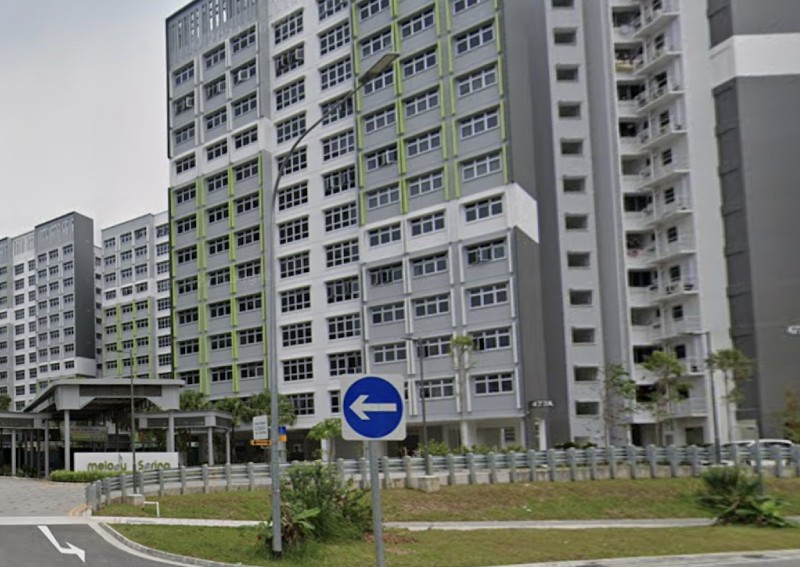
The Yishun resident demanded a walkway at his new Melody Spring Build-To-Order (BTO) flat.
Google Maps

Meet-the-People sessions (MPS) are a way for Members of Parliament (MPs) to connect with their residents, but there would be occasions where one would cross the line.
Taking to Facebook on Thursday (Nov 3), Nee Soon GRC MP K Shanmugam shared that fellow MP Derrick Goh was once threatened by a resident from Nee Soon Link.
Describing how the resident, named only as Paul, caused a scene at a MPS attended by Goh on Oct 10, Shanmugam shared that the former angrily shouted two "bullying demands".
For starters, Paul wanted a new one kilometre covered walkway from his new Melody Spring Build-To-Order (BTO) flat to Yishun Mall, Shanmugam said, adding that the resident claimed that the existing walkway was inconvenient for him since it would take an additional five minutes.
This request is unreasonable, according to Shanmugam. "To build another walkway is not proper use of residents' monies. If we took this approach, eventually the amount that residents have to pay will increase."
Paul also demanded that a bus service in the vicinity must start by December, Shanmugam said, pointing out that there is already an existing bus service that was added recently.
"He refused to listen to volunteers who tried to tell him how MyTransport.SG [mobile application] could be used to reduce waiting time," Shanmugam added.
Law and Home Affairs Minister K Shanmugam also called out Paul's outburst at the MPS.
"Paul made his demands in a threatening manner in the full view of other residents and volunteers there," he said, adding that the resident also threatened to shame and harass Goh on social media.
"This behaviour is quite unacceptable. Unfortunately, some are resorting to such behaviour."
AsiaOne has contacted Goh for more information.
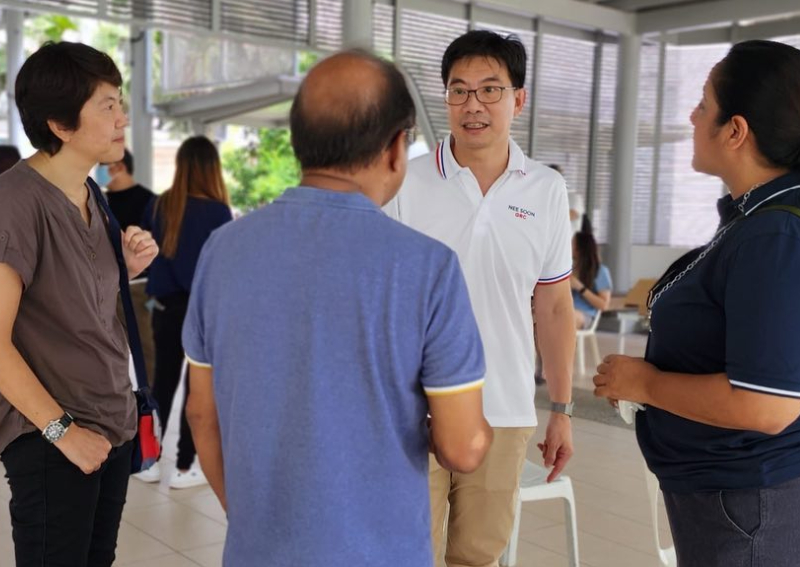
MP Derrick Goh at an estate party at Melody Spring @ Yishun on Oct 30.
PHOTO: Facebook/Derrick Goh Soon Hee
"The level of entitlement is incredible," a netizen said, while another called for measures to protect MPs from harassment.
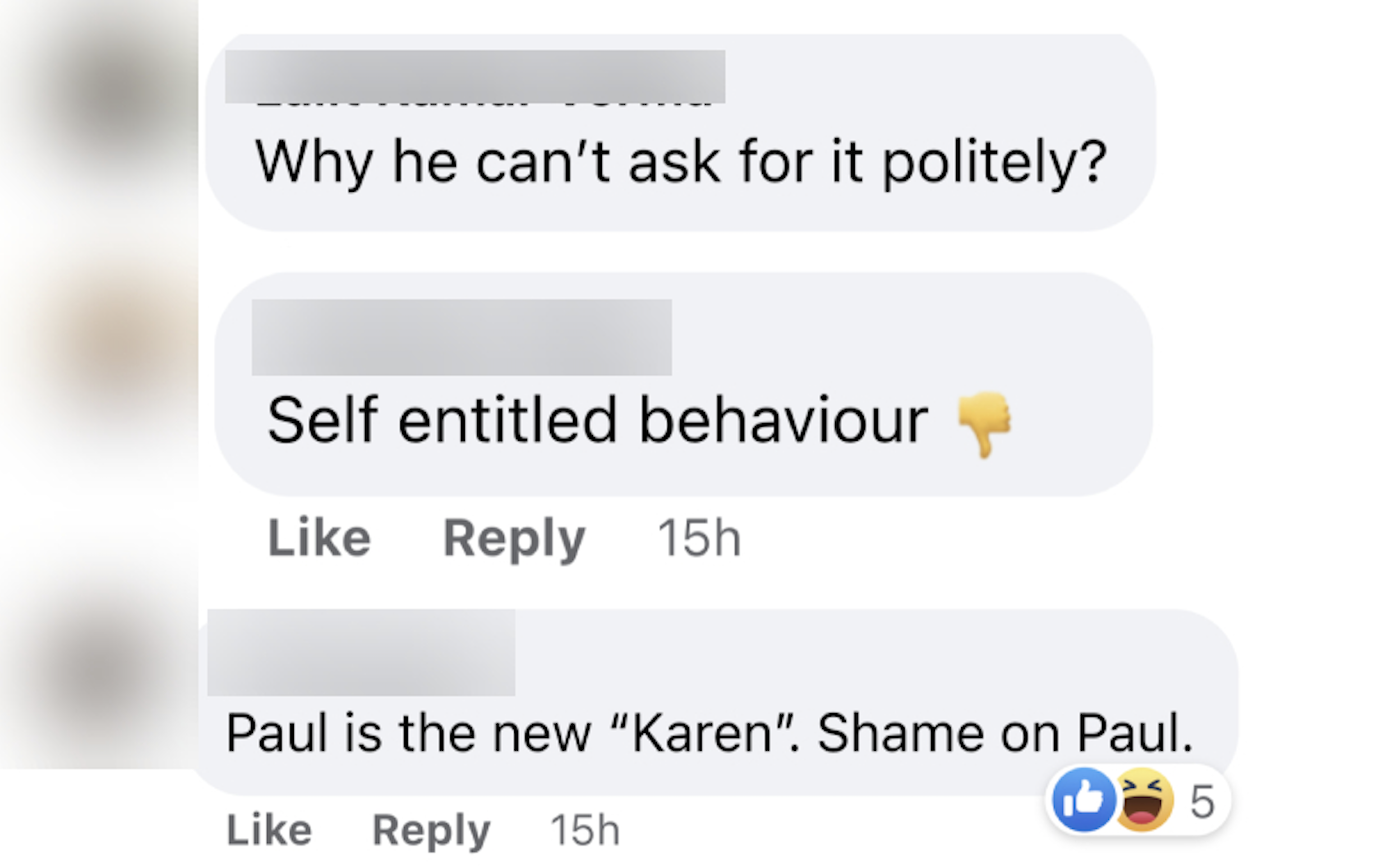
PHOTO: Screengrab/Facebook/K Shanmugam
Under the Protection from Harassment Act (POHA), it is an offence to threaten, abuse or insult another person with the intention to cause harassment alarm or distress.
Offenders may be fined of up to $5,000, while repeat offenders may expect penalties of up to a $10,000 fine and/or an imprisonment term of up to six months.
In another incident of MPs using social media to call out unacceptable behaviours, Sun Xueling recently criticised netizens for accusing her of having a free meal.
Taking to Facebook on Oct 10, the MP for Punggol West said: "I pay for my Hokkien mee and I wait to collect it like everyone else."
Sun also suggested that those who spread falsehood online should use the time to spread joy and do something constructive.
"The world will be a better place if we use our energies productively and positively," she said.
One kilometre is very long for a covered walkway.
Shanmugam calls out Yishun resident over 'bullying demands', threatening MP
 NOVEMBER 04, 2022PUBLISHED AT 3:37 PMByCHING SHI JIE
NOVEMBER 04, 2022PUBLISHED AT 3:37 PMByCHING SHI JIE
The Yishun resident demanded a walkway at his new Melody Spring Build-To-Order (BTO) flat.
Google Maps

Meet-the-People sessions (MPS) are a way for Members of Parliament (MPs) to connect with their residents, but there would be occasions where one would cross the line.
Taking to Facebook on Thursday (Nov 3), Nee Soon GRC MP K Shanmugam shared that fellow MP Derrick Goh was once threatened by a resident from Nee Soon Link.
Describing how the resident, named only as Paul, caused a scene at a MPS attended by Goh on Oct 10, Shanmugam shared that the former angrily shouted two "bullying demands".
For starters, Paul wanted a new one kilometre covered walkway from his new Melody Spring Build-To-Order (BTO) flat to Yishun Mall, Shanmugam said, adding that the resident claimed that the existing walkway was inconvenient for him since it would take an additional five minutes.
This request is unreasonable, according to Shanmugam. "To build another walkway is not proper use of residents' monies. If we took this approach, eventually the amount that residents have to pay will increase."
[Unreasonable behaviour, bullying demands at MPS] Our experience at Meet-the-People Sessions (MPS) is generally...
Posted by K Shanmugam Sc on Thursday, November 3, 2022
Paul also demanded that a bus service in the vicinity must start by December, Shanmugam said, pointing out that there is already an existing bus service that was added recently.
"He refused to listen to volunteers who tried to tell him how MyTransport.SG [mobile application] could be used to reduce waiting time," Shanmugam added.
Law and Home Affairs Minister K Shanmugam also called out Paul's outburst at the MPS.
"Paul made his demands in a threatening manner in the full view of other residents and volunteers there," he said, adding that the resident also threatened to shame and harass Goh on social media.
"This behaviour is quite unacceptable. Unfortunately, some are resorting to such behaviour."
AsiaOne has contacted Goh for more information.

MP Derrick Goh at an estate party at Melody Spring @ Yishun on Oct 30.
PHOTO: Facebook/Derrick Goh Soon Hee
'The level of entitlement is incredible'
In the comments, several netizens criticised the Nee Soon link resident for his "unreasonable behaviour"."The level of entitlement is incredible," a netizen said, while another called for measures to protect MPs from harassment.

PHOTO: Screengrab/Facebook/K Shanmugam
Under the Protection from Harassment Act (POHA), it is an offence to threaten, abuse or insult another person with the intention to cause harassment alarm or distress.
Offenders may be fined of up to $5,000, while repeat offenders may expect penalties of up to a $10,000 fine and/or an imprisonment term of up to six months.
In another incident of MPs using social media to call out unacceptable behaviours, Sun Xueling recently criticised netizens for accusing her of having a free meal.
Taking to Facebook on Oct 10, the MP for Punggol West said: "I pay for my Hokkien mee and I wait to collect it like everyone else."
Sun also suggested that those who spread falsehood online should use the time to spread joy and do something constructive.
"The world will be a better place if we use our energies productively and positively," she said.
Paralympic swimmer Sophie Soon in stand-off over guide dog at Rocky Master outlet in Hougang

Paralympic swimmer Sophie Soon with her guide dog, Orinda. ST FILE PHOTO

Anjali Raguraman
Correspondent
MAR 12, 2023
SINGAPORE – Paralympic swimmer Sophie Soon was involved in a confrontation with a Rocky Master employee when she patronised the cafe at the Hougang 1 mall on Wednesday night, accompanied by her guide dog and her mother.
In a video taken by Ms Soon and posted on Facebook, the female employee was seen speaking on the phone before telling Ms Soon – who is visually impaired – and her mother to sit outside its premises with the guide dog.
Ms Soon’s mother then asked the woman why they were being discriminated against, adding that guide dogs are allowed in restaurants by Muis, or the Islamic Religious Council of Singapore, and the Ministry of Sustainability and the Environment.
Asked what would happen if Ms Soon posted the video, the woman in the clip said: “Police report.”
“This happens practically every time I visit a new restaurant, which is a few times a week,” the 25-year-old told The Straits Times. Her guide dog, Orinda, has been with her since January 2022.
“It’s always the same when I go to a restaurant I haven’t been to before, where the staff on the ground have to check with management, and then I have to end up waiting 10 to 15 minutes.”
But this time, there was a half-hour delay before Ms Soon and her mother were seated.
Ms Soon claimed they were given three conditions by the employee in the video for remaining in the restaurant: The dog must be leashed, it must not be fed, and customers must not complain about the dog.
“As said many times before, guide dogs are allowed by law into all restaurant establishments, including halal establishments, as supported by Muis,” Ms Soon wrote in the caption accompanying the video.
In Singapore, guide dogs wear a yellow harness with text indicating that they are working dogs.
Guide dogs are approved and allowed in halal-certified premises, according to a Muis advisory.
The Housing Board and the National Parks Board’s Animal and Veterinary Service allow guide dogs to live in HDB flats. The National Environment Agency and the Singapore Food Agency also allow guide dogs in restaurants, foodcourts and cafes.
“How many more times do guide dog users have to be discriminated (against) before businesses finally educate themselves on the guide dog laws in Singapore?” Ms Soon wrote in the video caption.
In an Instagram post on Wednesday, Rocky Master said it does not discriminate against any diner.
“However, we are mindful to be considerate towards other diners who might not be comfortable with certain dining environments,” the statement said. “Hence, we ask that guide dogs be leashed... and preferably be seated at (the) outdoor seating area where possible.”
Rocky Master then said that the employee in question “may not be very experienced in handling such situations”, and that she checked with her superior before making any decision.
“Even under the circumstances of being filmed, she and the rest of the team maintained their composure and did their best to accommodate and fulfil your requests,” the statement added.
“We understand from our outlet manager that the staff (member) was traumatised due to the incident. We have since reached out to our staff member to express our care and concern.”
This is not the first time Ms Soon has had to address concerns by members of the public about her guide dog.
In November 2022, she uploaded a TikTok clip to address a Stomp story that quoted a passenger on an MRT train saying that she was worried Ms Soon’s dog might suddenly attack her and her baby, who was in a pram.
In the video, Ms Soon explained that guide dogs spend the first two years of their lives undergoing intensive training, including many tests and socialising.
She added that the dogs have to undergo a further three to four weeks of training with their handler before being allowed into the majority of public spaces.
“The only two spaces they’re legally not allowed in are restaurant kitchens and surgery rooms,” she said.
Ms Soon told ST that as a person with a disability, having a guide dog allows her to do the same things as an able-bodied person.
“They empower us so much to be able to live an independent life,” she said, referring to such dogs.
“When people say ‘go to another restaurant’, that’s not the point... The law supports us fully to be in there.”
She added: “At the end of the day, just like everyone else, I need to eat dinner... I have a life to live.”
"The law supports us fully to be in there.”
This is where Ms Soon got it wrong. The law supports her, but not fully.
Jade Seah calls out ‘self-entitled behaviour’ after getting note on windshield for parking in private estate
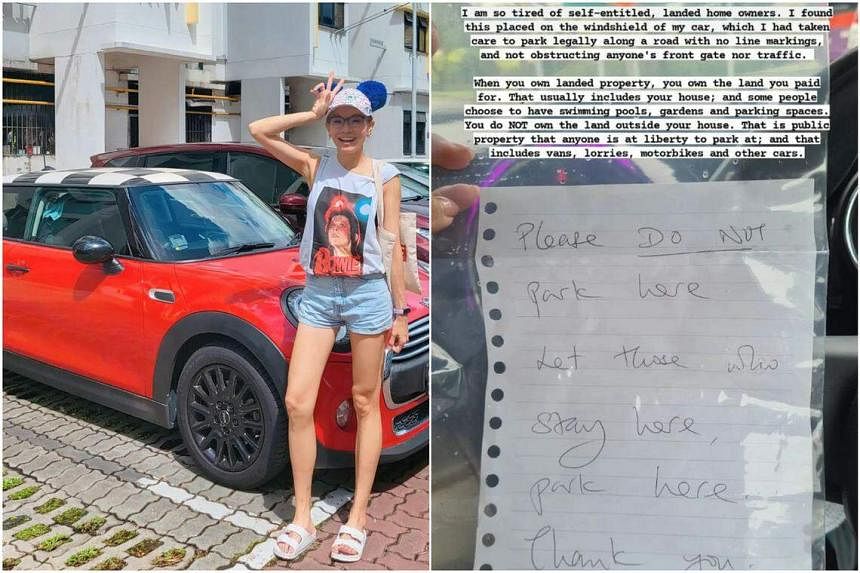
Jade Seah shared that she felt strongly about how “home owners bully others into submission”, as this was not an isolated incident. PHOTOS: JADE SEAH/INSTAGRAM
Suzanne Sng
Mar 23, 2023
SINGAPORE – Local host Jade Seah has taken to Instagram to call out what she deemed “self-entitled behaviour”, after finding a note on her car’s windshield asking her not to park along the road in a private estate.
Posting on Instagram Stories on Tuesday, the 39-year-old shared a photo of the handwritten note, which read: “Please do not park here. Let those who stay here, park here. Thank you.”
Seah wrote: “I found this placed on the windshield of my car, which I had taken care to park legally along a road with no line markings, and not obstructing anyone’s front gate nor traffic.”
“When you own landed property, you own the land you paid for. That usually includes your house; and some people choose to have swimming pools, gardens and parking spaces. You do not own the land outside your house. That is public property that anyone is at liberty to park at; and that includes vans, lorries, motorbikes and other cars,” she added.
“With all due respect though, sir/madam (and also to all other home owners who think you have priority or rights to the space in front of your house), I’m here to educate you that that is public space, and you have neither rights nor priority to make this request.”
The media personality shared that she felt strongly about how “home owners bully others into submission” as this was not an isolated incident. “My brother drives a van and he is afraid to park in roads where he has either been warned by home owners or has had his vehicle scratched. I have myself had tyres slashed as well as front bonnet scratched with a huge Z.”
She added that she has since installed both front and rear cameras in her car. She also recalled an encounter with an aggressive home owner who had shouted at her for parking in what she called “her lot”.
“Hate to say it, but full disclosure: I too have been afraid to park there since, and have not,” she said.
She concluded by asking her followers: “Does anyone else have the same feelings and is there something more we can do to educate and stop this sort of bullying, self-entitled behaviour?”
Similar threads
- Replies
- 14
- Views
- 1K
- Replies
- 1
- Views
- 359
- Replies
- 15
- Views
- 788
- Replies
- 27
- Views
- 2K
